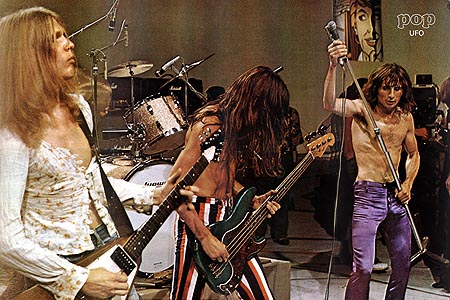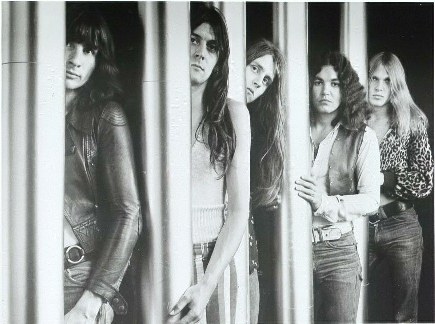

Photo and logo credits to: Angus' Wee Page, Rockshots Photography, Dave's UFO and Michael Schenker Page, Misty Green and Blue, UFO A to Z
You've heard of them. You know them. Black Sabbath, Led Zeppelin, Deep Purple, Queen, even Thin Lizzy. These were some of the cornerstone heavy rock groups that bridged the late '60s through the '70s during the first era of British hard rock.
So who was UFO, most mainstream American rock fans ask? It's ironic that certain members of huge heavy metal groups like Metallica, Iron Maiden, Queensryche and Def Leppard cite UFO as one of their most important influences ever but are virtually unknown to these metalhead fans.
UFO is a heavy rock group that began sometime in 1969 as the era of psychedelia was turing over to more straighforward types of rock. The deaths of Jimi Hendrix, Jim Morrison and Janis Joplin as well as the break-up of the Beatles were eerily symbolic as the 1960s drew to a close. They never made it into the 1970s (technically the year 1970 was still part of the prior decade). Phil Mogg (vocals), Pete Way (bass), Andy Parker (drums) and Mick Bolton (guitar, not to be confused with any other Bolton in pop music) started off as an interesting if raw space rock group. The songs from their first UFO 1 album are usual length and were recorded cheaply. They are melodic yet very primitive as the pentatonic solos are more filler than thriller. Flying, the second album, is more of a loose space rock jam with minimal vocals, but lots of instrumental frills. These, by today's standards, should only be for the die-hard collectors.
Bolton left, and thereafter was replaced by Larry Wallis and Bernie Marsden. The find of the ages after Marsden departed came in the form of the Scorpions founding guitarist, Michael Schenker. When UFO was in mainland Europe touring, they had no guitarist, so they borrowed the very talented blond German guitarist...and later kept him. Though Schenker at the time spoke next to no English, that didn't stop him from a fruitful collaboration with UFO (his first wife was translator).


The next album, Force It, in 1975 was heavier. By their standards, it was definitely UFO's heaviest album of the 1970s. Songs like "Mother Mary", "Let It Roll" and "This Kid's/Between the Walls" showcased just how rare it is for heavy metal groups to interplay incendiary electric guitar parts with softer delicate passages, a sense of dynamics. "Shoot Shoot" is one of the standard numbers from that album. For the first time, keyboards were heard on a UFO album, though they were played by Ten Years After ivory tickler Chick Churchill who filled in for the project. Probably at this point, guitarist Paul Chapman, an excellent player himself, was momentarily brought in to augment the live shows but he had other agendas and thus left.
